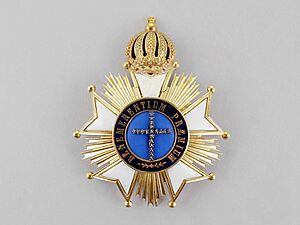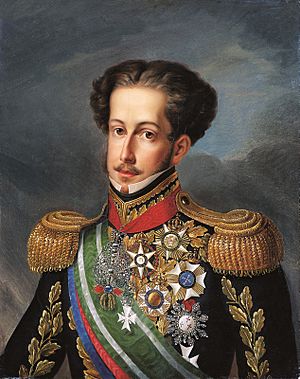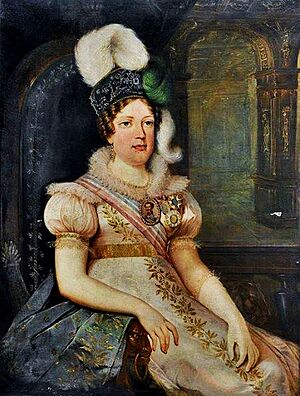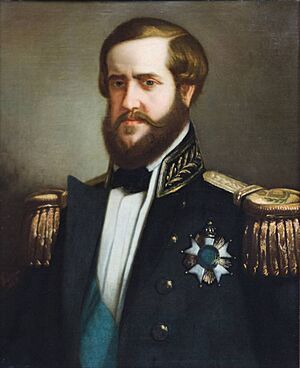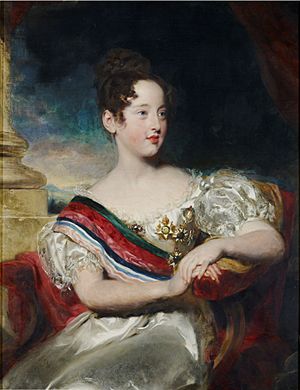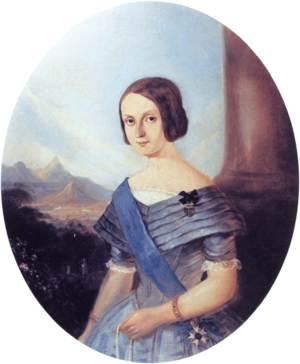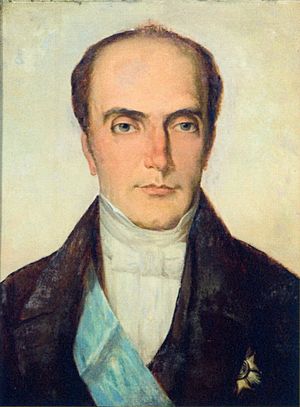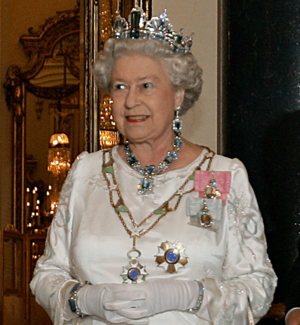Order of the Southern Cross facts for kids
Quick facts for kids National Order of the Southern Cross |
|
|---|---|
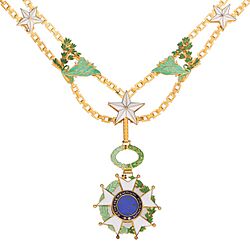
Grand Collar of the National Order of the Southern Cross
|
|
| Awarded by the Government of Brazil and the Brazilian Imperial Family |
|
| Type | National Order and dynastic order |
| Motto | Benemerentium Præmium |
| Eligibility | Foreign nationals |
| Awarded for | "As a token of gratitude and recognition for those who have rendered significant service to the Brazilian nation." |
| Status | Currently awarded |
| Founder | Pedro I of Brazil |
| Grand Master | The President of Brazil (the national order) |
| Chancellor | The Minister of Foreign Affairs |
| Grades | Grand Collar Grand Cross Grand Officer Commander Officer Knight |
| Statistics | |
| First induction | December 1, 1822 |
Ribbon bar of the National Order of the Southern Cross |
|
The National Order of the Southern Cross (Portuguese: Ordem Nacional do Cruzeiro do Sul) is a special award from Brazil. It was started by Emperor Pedro I on December 1, 1822. This award was created to celebrate Brazil becoming independent on September 7, 1822. It also marked the day Pedro I became Emperor.
The name "Southern Cross" comes from the Southern Cross constellation. This constellation is visible in the sky over Brazil. It also reminds people of the old name for Brazil, Terra de Santa Cruz (Land of the Holy Cross). This name was given when Europeans first arrived in 1500.
Contents
History of the Order
Originally, this award was called the Imperial Order of the Cross. Emperor Pedro I created it on the day he was crowned, December 1, 1822. On that same day, the first people received this honor. It was the first award created only for Brazil. Other awards at the time were shared with Portugal.
Changes Over Time
After Brazil became a republic in 1889, all old royal awards were stopped. But the Order was brought back on December 5, 1932. This happened under the government of Getúlio Vargas. It was renamed the National Order of the Southern Cross.
Before 1932, Brazil did not have national awards for civilians. The re-established Order of the Southern Cross became the most important national award. During the time of the Empire, it was not the highest award. It ranked below older awards that came from Portugal. However, among awards created by Brazil, it was the most important.
Today, the old Imperial Order is still used by the Brazilian Imperial Family. But the government of Brazil does not officially recognize these awards.
Who Leads the Order?
Just like the Emperors of Brazil were the leaders of the Imperial Order, the Presidents of Brazil are the leaders of the National Order. The current President of Brazil, Luiz Inácio Lula da Silva, is the Grand Master of the Order.
Who Can Receive This Award?
The Imperial Order could be given to both Brazilians and foreigners. But the National Order, which was brought back in 1932, is only given to people from other countries. This is because giving the award is seen as an act of foreign relations by the Brazilian government.
Why Only Foreigners?
When the Order was re-established, Brazil did not want to create awards for its own citizens. This was because the government at the time thought awards were against the idea of a republic. However, Brazil needed a way to honor important people from other countries. For example, in 1922, many foreign leaders visited Brazil. They gave awards to some Brazilians. Brazil needed a way to give awards back.
So, the National Order of the Southern Cross was created to fill this need. Today, Brazilians can accept awards from other countries. Also, Brazil has created other awards for its own citizens. But the National Order of the Southern Cross still remains only for foreigners. This means the President of Brazil, who leads the Order, is never actually a member of it!
How Awards Are Given
Awards and promotions in the National Order of the Southern Cross are decided by the President of Brazil. The President signs a special order, which is then made public. The awards are also recorded in a special book.
The Minister of Foreign Affairs for Brazil acts as the Chancellor of the Order. This person helps manage the Order. There is also a Council that suggests who should receive awards.
Different Levels of the Order
The Order has a Grand Master (the President) and six different levels, or "Classes," of members:
- Grand Collar: This is the highest level. The person wears a special chain with the Order's badge. They can also wear a star on their chest and a blue sash. This award is only for leaders of other countries.
- Grand Cross: The person wears a blue sash over their shoulder. The Order's badge hangs from the sash. They also wear a star on their chest.
- Grand Officer: The person wears the Order's badge around their neck on a blue ribbon. They also wear a star on their chest.
- Commander: The person wears the Order's badge around their neck on a blue ribbon.
- Officer: The person wears the Order's badge on their left chest, hanging from a ribbon with a small rosette.
- Knight: The person wears the Order's badge on their left chest, hanging from a simple ribbon.
| Ribbon bars | |||||
|---|---|---|---|---|---|
| Knight | Officer | Commander | Grand Officer | Grand Cross | Grand Collar |
Famous People Who Received the Order
Many important people from around the world have received the National Order of the Southern Cross. Here are a few examples:
- Leaders of Countries:
* Queen Elizabeth II (United Kingdom) * Nelson Mandela (South Africa) * Charles de Gaulle (France) * Dwight D. Eisenhower (United States) * Josip Broz Tito (Yugoslavia) * Haile Selassie (Ethiopia) * Hirohito (Japan) * Juan Carlos I (Spain) * Beatrix (Netherlands) * Margrethe II (Denmark) * Carl XVI Gustaf (Sweden) * Harald V (Norway) * Henri (Luxembourg) * Mauricio Macri (Argentina) * Sergio Mattarella (Italy) * Marcelo Rebelo de Sousa (Portugal) * Narendra Modi (India) * Naruhito (Japan)
- Other Notable People:
* Neil Armstrong (American astronaut) * Michael Collins (American astronaut) * Yuri Gagarin (Soviet cosmonaut) * Che Guevara (Revolutionary) * Helen Keller (American activist) * David Rockefeller (American banker) * Stefan Zweig (Austrian writer) - received posthumously (after his death) * Daisaku Ikeda (Japanese spiritual leader)
Cities Honored
- Medellín, Colombia (2016) - This city was honored for its support after a plane accident (LaMia Flight 2933).
See also
 In Spanish: Orden de la Cruz del Sur para niños
In Spanish: Orden de la Cruz del Sur para niños
 | George Robert Carruthers |
 | Patricia Bath |
 | Jan Ernst Matzeliger |
 | Alexander Miles |


